University Professors In Iran Fired Over Folkloric Dance In Graduation Ceremony
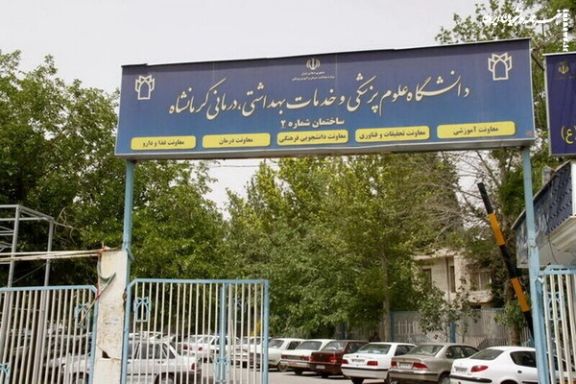
Several Iranian university professors have been sacked over participating in the graduation ceremony of their students because some people danced in the celebrations.

Several Iranian university professors have been sacked over participating in the graduation ceremony of their students because some people danced in the celebrations.
According to the United States-based Human Rights Activists' News Agency (HRANA) on Saturday, seven professors of the medical university of Kermanshah were fired over "boys' and girls’ mixed Kurdish dance" and "loose hijab" during the graduation ceremony of pharmacology students, which was held early in June.
Following the release of a video of the soiree on social media, the public relations office of this university denounced the event as "breaking red lines" and claimed that this ceremony was held without any permit.
In a statement, the union council of the pharmacology faculty denied that these professors danced in the ceremony or were even there during the local dance, noting that the ceremony was authorized.
The statement claimed that after the official end of the graduation ceremony, the professors left and only the families of the students were present when they celebrated with a brief Kurdish dance as is customary in Kurdish festivities.
Islamic laws in Iran forbid dancing, although many people dance during family gatherings in their homes.
Iran’s hardliner president has recently ordered all government entities to strictly implement a “chastity and hijab” law after weeks of stricter measures on the streets.
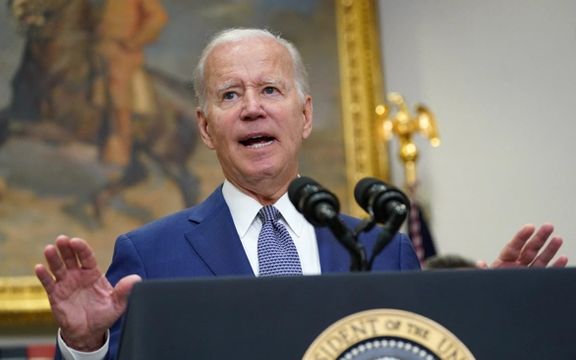
Iran has been diplomatically isolated during his 18 months in office, President Joe Biden argued in an opinion piece published Saturday by The Washington Post.
Biden also wrote that the Middle East is “more stable and secure” now than during the presidency of Donald Trump.
Prior to his trip to the region Biden tried to defend his diplomatic record and efforts of military deterrence, arguing that attacks against US targets have decreased and a ceasefire has been declared in Yemen.
The President said that when he took office the United States was isolated on the issue of Iran, as his predecessor had withdrawn from the 2015 nuclear agreement known as the JCPOA, which “was working” and found itself “isolated and alone” at the United Nations Security Council.
“With respect to Iran, we reunited with allies and partners in Europe and around the world to reverse our isolation; now it is Iran that is isolated until it returns to the nuclear deal my predecessor abandoned with no plan for what might replace it,” he said.
Biden also took credit for a vote at the International Atomic Energy Agency’s Board of Governors on June 8, when “30 countries joined us to condemn Iran’s lack of cooperation,” he said and added, “My administration will continue to increase diplomatic and economic pressure until Iran is ready to return to compliance with the 2015 nuclear deal, as I remain prepared to do so.”
But the president also made a series of claims not exactly reflecting reality.
While there is more Western diplomatic coordination in dealings with Iran, but that country has almost reached a nuclear threshold stage during Biden’s presidency and is violating more US oil export sanctions. Iran has now sufficient enriched uranium for one nuclear bomb.
Biden said that after Trump’s withdrawal from the JCPOA, “Iran had passed a law mandating the rapid acceleration of its nuclear program.”
He was referring to a law tabled in the Iranian parliament on November 4, 2020, to elevate uranium enrichment to 20 percent, the day after the US election, and 17 months after Trump abandoned the deal.
The Iranian escalation came after candidate Biden published an opinion piece on CNN in September 2020 saying Trump’s decision was a big mistake and he would retore the JCPOA. It seemed that Iranians seeing Biden willing to negotiate escalated their nuclear program.
The escalation continued in early 2021 with uranium enrichment reaching 60-percent purity, as the Biden Administration began negotiations with Tehran.
Before Biden’s election, Tehran had retaliated against Trump by a small increase in the level of enrichment, but nowhere close to accumulating highly enriched fissile material for a bomb, as is the case now.
The President also made claims about more stability in the Middle East which leave room for questions.
He said that attacks against US targets substantially decreased after he ordered retaliation for Iran-backed rocket strikes. But US troops have been targeted at least 29 times since October 2021 without any military response, a critic said.
He also did not mention dozens of Iran-backed Houthi missile and drone attacks against Saudi Arabia in 2021 and 2022, with the aggression expanding to the United Arab Emirates earlier this year.
Iran also continues its terror activities in the region, as recent events in Turkey showed and pro-Iran groups such as the Hezbollah and Hamas maintain a highly aggressive posture toward Israel.
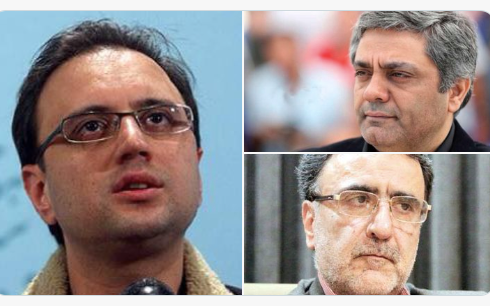
The Reform Front of Iran made up of several groups held an extraordinary meeting Saturday to discuss the arrest of prominent reformist activist Mostafa Tajzadeh.
The pro-reform Iranian Labor News Agency (ILNA) reporting on the meeting said that the activist was arrested when he was alone at home, so there is no information about where he has been taken.
Tajzadeh's wife, Fakhrossadat Mohtashamipour, said a video released on Twitter that someone from the Prosecutor's Office called her and said that her husband will be “a guest for a few days.” She said in another video that the "government is trying to make up for its inability to run the affairs of the state and wasting of national resources by arresting reformist activists."
Meanwhile, the Reform Front's Spokesman Ali Shakuri Rad wrote in a tweet that Supreme Leader Ali Khamenei probably knew about Tajzadeh's arrest.
Two Iranian filmmakers, Mohammad Rasoulof and Mostafa Alehahmad were also arrested on Friday for encouraging other artists to sign a petition in support of the people of Abadan and other cities during their protests in May. The petition called on security forces to put down their guns and refuse to shoot protesters.
The Iran Human Rights Organization on Saturday condemned the two filmmakers' arrest as "an elaborate violation of human rights in Iran" and a move that signalled the weakness of the Islamic Republic. The organization's chief Mahmoud Amiri Moghaddam described the arrests as "the government's useless attempt to scare the society and to silence rights defenders." Meanwhile, he called on the international community to react to these events.
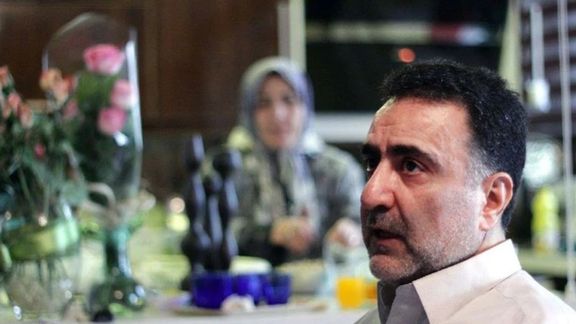
Several other activists including women's rights advocate Faezeh Hashemi and National Front Leader Kourosh Zaim have also been reportedly indicted or summoned to the courts in Iran during previous days.
Meanwhile, reformist commentator Abbas Abdi wrote in a series of tweets that there could be more than one reason for Mostafa Tajzadeh’s arrest. These reasons, include his willingness to debate with regime change advocates on the social media chat application Club House in recent weeks. Tajzadeh who has become an outspoken critic of Iran’s hardliner rulers, he has nevertheless remained loyal to the ideal of an Islamic Republic.
Abdi summarized the other reasons for Tajzadeh's arrest as related to the shifting political atmosphere in Iran. Many recent developments have put the government on the defensive. The failure of nuclear negotiations with the United States, mysterious incidents showing possible Israeli infiltration in Iran’s security and intelligence networks, resulting in major changes in IRGC intelligence, all coincided to negatively impact the government’s image.
The authorities wanted to send a message to the public that these developments have not weakened it and limitations on freedom of speech and political activity remain in force.
Hours after Tajzadeh's arrest, Alireza Soleimani, the editor of the ultraconservative Raja News website, a mouthpiece of the Paydari Party, wrote in a tweet on July 8 that "Tajzadeh is not the last one to be arrested."
Several Twitter users including Ali Pourkheiri wrote that "Tajzadeh's arrest is a precious gift to the Iranian opposition," reminding of his role in advocating reforms rather than regime change in Iran.
Human rights activist Hassan Younesi addressed Khamenei in a tweet and wrote: "You are making your choice between reforms and regime change."
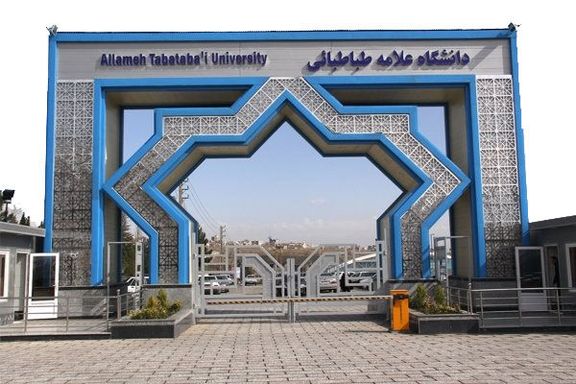
Iran has confirmed that the Iraqi Ministry of Higher Education has removed 27 Iranian universities from its list of recognized universities.
Hashem Dadashpur, a deputy of the Ministry of Science, Research and Technology, said on Saturday that "In this academic year, Iraq has adopted strict conditions in its evaluation system."
The list is for Iraqi students who want to continue their studies abroad on government’s scholarships.
He explained that the Iraqi Ministry of Higher Education used Times Higher Education World University Rankings, QS World University Rankings, and Shanghai Academic Ranking of World Universities to evaluate foreign universities, which led to the omission of some Iranian institutions.
Dadashpur said the decision is not specifically related to Iranian universities and many universities from Belarus, Jordan and Lebanon are also removed from the list, noting that 14 Iranian universities are still in the list.
According to him, currently 56,000 Iraqi students are studying in Iranian universities.
Several of the Iranian universities are institutions established after the 1979 revolution to promote Shiite Islamic ideology.
In recent years, numerous reports have been published about the decline in the quality of education in Iranian universities, which has led to the migration of elite students from the country.
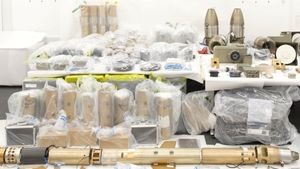
Britain’s announcement this week of the seizure at sea of weapons apparently heading for Yemen followed expert examination assessing they had come from Iran.
Thursday’s statement from the United Kingdom Ministry of Defence justified the Royal Navy impounding surface-to-air missiles and other hardware under United Nations Security Council resolution 2140, passed in 2014. This imposed an arms embargo on named leaders of Ansar Allah, or the Houthis, and was in February extended to the Houthis as a whole.
The anti-ISIS coalition, Inherent Resolve, tweeted that the “successful seizure of smuggled Iranian missiles is another example of Iran violating int'l law, supporting terrorism & threatening Int’l peace & security. Together with our allies & partners, we remain committed to deterring their destabilizing activities.”
The British announcement came with Yemen in the fifth month of a fragile ceasefire between the Houthis and Saudi Arabia, just ahead of United States President Joe Biden’s 13-16 July Middle East visit, and with US-Iran nuclear talks paused.
US Republican Senator Jim Risch, ranking member of the Foreign Relation Committee tweeted, “As the Biden Admin tries to rush back into the JCPOA, Iran continues to destabilize the Middle East and flood the region with illicit weapons. US sanctions relief will only serve to increase Iranian terrorism.”
London’s statement on the arms seizures said marines, deployed in inflatable boats from the Royal Navy ship HMS Montrose, had found the weapons in “speedboats being operated by smugglers in international waters south of Iran” on January 28 and February 25, following the scanning of vessels by helicopters.

The weapons were returned to the UK for technical analysis that “revealed that the shipment contained multiple rocket engines for the Iranian produced 351 land attack cruise missile and a batch of 358 surface-to-air missiles.”
The cache was also inspected on June 24, said the British statement, by experts appointed by the UNSC – which might account for the timing of Thursday’s announcement some months after the interception.
‘Loitering’ missiles
This is believed to be the first British interception of relatively sophisticated weapons supplied to the Houthis by Iran. The 358 is a ‘loitering’ missile designed to stay aloft and target airplanes, while the 1000-km-range 351 cruise missile has been fired by the Houthis at targets in Saudi Arabia and was possibly used to attack Abu Dhabi on January 17, killing three civilians. Similar missiles were impounded by the USS Normandy in the Arabian Sea in 2019.
The Iranian foreign ministry in a tweet Thursday disputed the “moral authority” of the British to “make a claim” against Iran, arguing that the UK was “continuously selling advanced weapons to the self-proclaimed military coalition against the defenseless people of Yemen,” making the UK “a partner in the war and aggression against Yemen…and…not in a position to make such baseless accusations...”
The UK has faced criticism over arms sales including strike aircraft to Saudi Arabia, which began its armed intervention in 2015 in support of ousted president Abdrabbuh Mansur Hadi against Houthi rebels.
Yemen ceasefire
The current four-month ceasefire in Yemen is expected to be high on Biden’s agenda in his looming visit to Saudi Arabia, part of the US president’s Middle East tour July 13-16. There have been reports that the Yemen ceasefire was negotiated by the Saudis in Beirut with Hezbollah, the Lebanese party allied to Iran, acting on behalf of the Houthis.
Sea lanes around Yemen are increasingly contentious. Israeli Defense Minister Benny Gantz claimed Tuesday that Iran was expanding its naval presence in the Red Sea.
The HMS Montrose, a type 23 frigate, operates as part of the 38-nation Combined Maritime Forces (CMF), which counters illicit non-state operations including drug seizure. In January HMS Montrose seized one shipment of 663kg of heroin, 291kg of hashish and 87kg of methamphetamine in the Gulf of Oman.
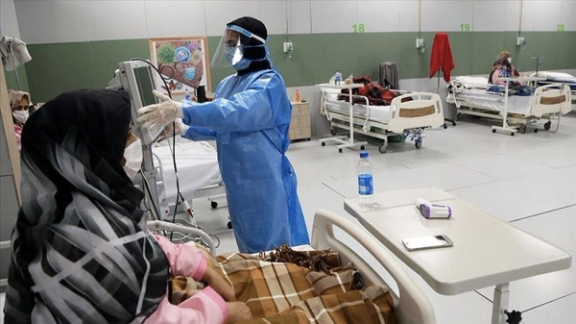
The growing number of Covid-19 patients in Iran has prompted the Health Ministry to announce new restrictions in the country while several provinces are deemed "red zones.”
Expressing worries over the resurgence of the pandemic across the country, the spokesman for Iran’s Covid-19 taskforce, Abbas Shirozhan, said on Saturday that four cities are now "red," 14 cities are categorized as "orange,” and 142 cities as “yellow.”
Shirozhan called on the people to use masks, especially in the cities with higher numbers of people infected with the virus.
Last week, the Health Ministry announced that the number of people hospitalized due to Covid-19 complications has tripled, as new variants are about to sweep across the country.
Masoud Younesian, the secretary of the epidemiology and research committee of the national coronavirus taskforce, said on July 1 that two new subvariant of Omicron, namely BA4 and BA5 -- which started in the African continent -- may soon prevail over the country.
Iran’s homegrown Covid vaccine factories are shutting down for lack of demand as many vaccinated with foreign vaccines refuse to get homegrown ones as boosters.
According to the latest official figures, nearly 65 million Iranians have had one dose, 58 million two doses but only 27 million have had a third shot of the vaccine. Vaccine imports stopped a few months ago and the only vaccines available for a booster now are homegrown variants.
The number of deaths in Iran since Covid-19 began has been 300,000 higher than in previous years, suggesting pandemic deaths may be more than officially reportedfigure ofaround 141,000 deaths.